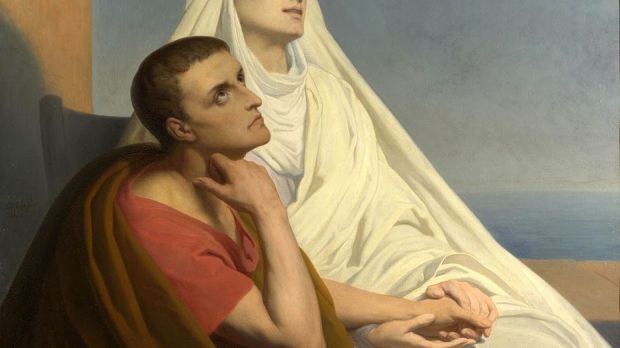Lenten Campaign 2025
This content is free of charge, as are all our articles.
Support us with a donation that is tax-deductible and enable us to continue to reach millions of readers.
Before St. Augustine was a saint, he was in trouble.
And as is often the case, his mother knew it.
So Monica did what was necessary. She talked to him, counseled him and implored him to change. You are on the wrong path, Augustine. Change your ways. And when he didn’t, she wept and prayed.
As Augustine would recall in his spiritual memoir, Confessions, his mother told him of a dream she had. Weeping bitterly, bereft of hope, she found herself standing on a wooden ruler with a “shining youth walking toward her.” He was smiling and cheerful in stark contrast to her wrenching and quite visible grief. The young man asked why she was grieved and she told him of her lost son. At that point, he consoled her pointing to where she stood on the ruler saying,
“That where [Monica is], there [is Augustine] also.”
The ruler, it is thought, corresponded to the orthodoxy of the Catholic Faith (as revealed through the Gospels, Old Testament, Letters, Liturgy, Tradition and Teachings) and one day Augustine would, Monica is assured, find his way to orthodoxy. But not yet. And so Monica would continue to ache.
Before long, Monica would approach a bishop who had once been lost in the heresies in which Augustine now found himself. She hoped he might talk some sense into her son. Augustine recalls,
[My mother] asked [the bishop] if he would be so kind as to talk to me, to rebut my errors, disabuse me of my harmful persuasions and teach me good ones; for he was used to doing this, whenever he happened to find anyone apt to profit by it. He refused, however, and very wisely, as I subsequently understood. He replied that I was as yet unteachable; I was puffed up with the novelty of my heresy and had been tormenting plenty of unskilled persons with finicky little questions, as she told him. “Leave him alone,” he advised. “Simply pray for him to the Lord. He will find out for himself through his reading how wrong these beliefs are, and how profoundly irreverent.”
Her tearfulness continued and in desperation she plead all the more. The bishop answered,
“Go away now; but hold on to this: it is inconceivable that he should perish, a son of tears like yours.”
Augustine would ultimately change his ways. Not only would be become a Christian, a bishop, a Father of the Church and a saint, but he became a son who returned home to his mother. A son of tears who did not perish.
What is so extraordinary about this story isn’t simply Augustine’s conversion, but the prayers that converted him. In his deepest, darkest and most dislocated hours, as Augustine would freely admit, it wasn’t his prayers that brought him to God. He wasn’t even praying. It was his mother’s.
Lest we ever take for granted the power of our prayers and the responsiveness of God in the lives of others (or ourselves), we should take a moment and consider the unfailing devotion of St. Monica and the affirming wisdom of the bishop to “simply pray for him”. God is earnestly looking for his lost sheep, searching for the lost coin, opening his arms to his prodigal sons and daughters. But he is further moved by our prayers. Sometimes those who are lost don’t know it, but someone who loves them does. Prayers for the lost are often unrecognized, but always indispensable. And who knows, perhaps our lives’ greatest prayers weren’t even uttered by us. They were offered by somebody else.
Perhaps that’s what one needs to start finding their way home.
Just ask St. Augustine.
St. Monica, pray for us.
Read more: Prayer to St. Monica: Help my child return to Christ!
Photo credit: Wikimedia Commons
(Saint Augustine and his mother, Saint Monica by Ary Scheffer (1846)
The prayers of others

